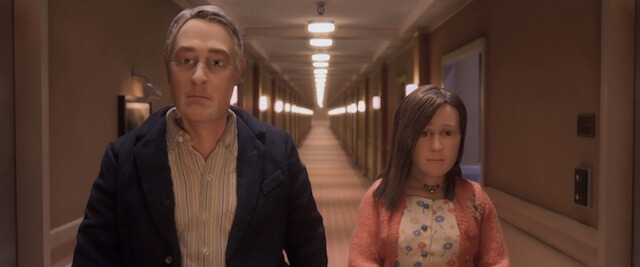‘Anomalisa’ Charlie Kaufman movies used to be funny. They still are, kind of. Before breaking through with “Being John Malkovich” — which instantly made him a screenwriter-as-brand, his name becoming an adjective a la “Kafkaesque” — he wrote on the staffs of programs like “Get a Life” and “The Dana Carvey Show.” The movies made from his ostentatiously clever screenplays, including “Adaptation” and “Eternal Sunshine of the Spotless Mind,” were funny too, even as they plunged into brutal honesty and depressive headspaces. RELATED: Interview: Charlie Kaufman says the puppet sex in ‘Anomalisa’ isn’t supposed to be funny The two films Kaufman has directed himself are full-on, no-joke depressive. That’s not to say there are no jokes in “Synecdoche, New York” and his latest, “Anomalisa” (co-directed with Duke Johnson), though they’re funny only occasionally, as if he simply couldn’t resist a gag. But both are deep stews in one person’s overwhelming and suffocating misery, using high-concept gimmicks to trap us inside crushing solipsism. They’re not themselves egocentric, though. “Synecdoche” is a critique of self-absorption; “Anomalisa” is an emotional plea, beckoning us to find pity for a tragic figure who can’t get outside of himself. The gimmick in “Anomalisa” is not just that everyone’s a puppet; it’s that to its semi-hero — beloved motivational speaker Michael Stone — everyone is so boring to him that they all speak with the same voice. Michael is voiced by David Thewlis; everyone else gets Tom Noonan. Holing up for some hotel room drinking during a Cincinnati conference, he wanders lonely through life — until he suddenly and mysteriously hears a unique voice among the Noonan din. She’s Lisa, and she boasts the voicework of Jennifer Jason Leigh. But she’s not on-her-face special; she’s painfully ordinary — an insecure wallflower who can’t believe it when a small-time celebrity is macking on her. “Anomalisa” is Kaufman’s first film in seven years following years of aborted projects in an industry less and less open to the outside-the-box fare that made him a name filmmaker. There’s an air of desperation to it: not only was it produced on the cheap, but it’s not even an original work. Kaufman reworked and expanded upon his mid-length 2005 play, which featured actors — the same actors, in fact — speaking in the dark. Even with puppets it feels smaller than Kaufman’s previous work. His older scripts teemed with ideas and gags and insecurities and heartache. “Anomalisa” is more focused, almost single-minded. The jokes, when they come, can seem forced. (Though its best gag is one for the ages: an all-puppet and all-Noonan version of the screwball great “My Man Godfrey” on Michael’s TV.) Even its serious moments seem one-note. The splashiest set piece is a sex scene between Michael and Lisa, with puppet shtupping that’s nearly as graphic as the one in “Team America” (minus the urinating and defecating, natch), only played straight. But once you get what it’s doing there’s nothing else to get. It’s, if you will, for a movie about puppets, skin deep. RELATED: Interview: Andrew Haigh hopes “45 Years” makes people get divorced (not really) What it lacks in writerly ambition it makes up for in an unusual-for-Kaufman emotional directness. Kaufman is always sincere, but he’s also adamant about coating heartache in humor and clever writerly hooks. “Eternal Sunshine of the Spotless Mind” is an absolutely gutting look at a break-up, but it frequently goes out of its way to distract viewers from its pain, just as its hero is trying to literally erase sad memories from his mind. Nakedly honest though they are, it always takes work digging to the broken heart in a Kaufman film. “Anomalisa” has a self-involved protagonist with a history — and a present, and probably a future — of hurting people. But he’s fragile. Thewlis stresses the desperation in his voice, and the puppet design has him hunched over, weighed down by his overwhelmingly negative worldview. He hates himself yet he can’t escape his nature. “Anomalisa” can often seem as small as Michael’s tiny, shallow vision of the world, but instead of that being a detriment, it seems both appropriate to the material and like an artist sanding his shtick down to the nub. It’s the saddest movie of Kaufman’s career. Perhaps the only thing he could do next is something truly and weirdly happy.
Directors: Charlie Kaufman and Duke Johnson
Voices of: David Thewlis, Jennifer Jason Leigh
Rating: R
4 (out of 5) Globes
‘Anomalisa’ is the saddest Charlie Kaufman movie, which is saying something

Paramount Pictures
Follow Matt Prigge on Twitter @mattprigge


















